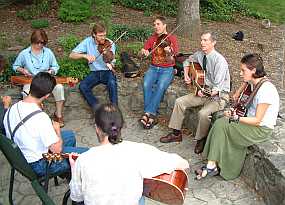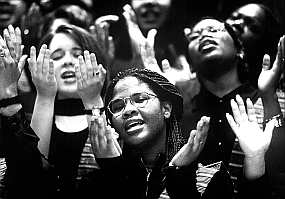Sunday night, my church shared a Thanksgiving feast together. And while some may believe Lutherans have cornered the market on potluck dinners, my Pentecostal church did a fine job.
So I went off my diet for a day. Sometimes you have to savor the moment with friends.
When I think about one area of our lives as Christians where our walk doesn’t match our talk, it’s in building real community. The word community lingers on the lips of so many Christians today, but when I look around I don’t see much community. At least not real community that bursts ungodly societal constraints.
In talking with a friend from church, Don, we both commented on how dependent we have become on technology in our lives. Don mentioned that one finely placed electromagnetic pulse over the United States, crippling most of our electronics, would have a destabilizing effect on our society. In many ways, we have made ourselves so dependent on our cell phones, computers, cable TV, and even the simple electronics that run a stoplight, that to lose them for an extended length of time would wreak utter chaos.
I believe Don is correct. When I lived out in California, an intersection lost a stoplight for a few minutes and someone who didn’t like the snarl that occurred got out a gun and started shooting. With people wound so tightly by our modern society, should we be surprised?
Even if society should fail to collapse without our tech gadgets, those electronics have changed us in profound ways. Call me a neo-Luddite, but I believe that many of those devices have already had a destabilizing effect on our society, especially when it comes to experiencing genuine community.
The items we buy, especially advanced machinery and electronics, may make our lives simpler, but they also make us self-sufficient to the exclusion of others. We live in an age dominated by the idea that we do not need each other. Our machines have made it possible for us to exist apart from other people. Many would consider this a positive, but when it comes down to how God made us, it’s clear that the very foundations of community are specters of their former selves.
The result? We have become a disconnected and depressed people.
One of the radical truths of the Gospel we can’t escape is that Jesus is NOT so much a personal Savior as He is a a Savior of a people, a people He is drawing to Himself. The Marriage Supper of the Lamb will not be you alone in a room with Jesus, but with the whole host of believers from all time. If we are being fitted to heaven by our time on this blue orb, then that fitting must be thought of in terms of community.
Yet we do little this side of eternity to live in community.
Our problem stems from our inability–to use a much overused phrase–to think outside the box. I remember many years ago how my old neighborhood experienced a power outage that blackened TVs, silenced video games (Atari 2600s back then), and stilled the bits and bytes of computers (Commodore 64 and Apple IIe). Right after supper, the electronics stilled, the soft voice of that beautiful summer night called to people. The next thing I knew neighbors were chatting in each other’s yards, kids were playing impromptu games of Kick the Can and softball, and the neighborhood came alive. But when the power kicked on an hour or so later, the neighborhood took on the feel of a tomb. People had trudged back to their electronic distractions, each homeowner shutting on the door on his or her personal fortress.
We’re still locked up today. Perhaps more so.
But the Bible is a story of God and the community He is creating. The Gospel exists for people and is meant to be shared between people, to be celebrated in community. Christ’s clarion call in the Great Commission is Christ’s call bids us, his people, to go out and bring in more people to the Church. We exclude no one. The widow, orphan, and immigrant are to be welcomed in our midst. Jew and Gentile, all are welcome. What Christ is building has no limits and no boundaries, save for our own unwillingness to participate in the work.
This is why we Christians MUST rethink how we view the Gospel and the Kingdom. Every effort we make, the very way we live, must be oriented toward outreach. Even when we play, we don’t play alone, but with others. It’s our mandate.
Do we see how this is at complete odds with our societal constructs? We talk about relevancy in the Church, but the truth is that most of how we are to live cannot be shoehorned into society and culture. Instead, they must conform to the ideals of Christ. This means we Christians must learn to think like Christians and not like the world.
Well, no duh, right? We all know this.
Do we?
Think about a common activity we enjoy today: listening to music on our iPods. We Christians should ask ourselves how this solitary activity connects us in community to other people. Truth is, it accomplishes quite the opposite effect. Worse, it disempowers the listener, forcing him or her into a consumer mode. The music is disconnected from the hearer and from the community. Something is ultimately lost in the process.
So what is the truly Christian response, the one that works toward community and sharing among people?
What would happen if instead of reaching for the iPod, we make music ourselves? And what if we make it in community, getting together with others to play and sing?  Such a move makes us less dependent on consuming and more dependent on each other. Not only this, but we encourage others to use their gifts. We provide an example to the young and to each other. The musical talents we share uplift the community that forms around our music.
Such a move makes us less dependent on consuming and more dependent on each other. Not only this, but we encourage others to use their gifts. We provide an example to the young and to each other. The musical talents we share uplift the community that forms around our music.
When we keep community in mind, we form relationships that build networks of dependency that shatter our self-reliance and return us to God’s ideal interaction. He walked with Adam in the garden because He is a relational God. How then do we approach all of life with this mindset?
Why do our families eat alone? What if the rarity was to eat just by ourselves? Should we not have others eating in our homes on a regular basis? Wasn’t this one of the unusual hallmarks of the early Church? I believe we Christians must start opening our homes on a regular basis so that few of our meals are eaten just with our own nuclear family. What better way to talk with others about what God is doing in our lives than in this kind of atmosphere?
How would this kind of thinking change our culture?
What if Christians were at the forefront of the slow food movement, taking time to prepare good food made without extreme processing, and always share that food with a group? What if we set aside our evenings for being with other people around a table of homemade food? How would that transform our understanding of community?
Even if we were to go out to eat at a restaurant, why not pay the way of some people we don’t know well so they might join us and begin to share in our community?
What would it mean for the Christian community to live in such a way that we share what we have rather than buying redundant copies of everything we believe we need? Would we be able to work fewer hours and devote more time to the Gospel and to others?
Consider what might happen if we begin to forgo purchasing more junk for ourselves so that we might consider the needs of others. Watch this video to see how one church thought better of building a new building and decided to put that money to a more Christ-centered use. Then consider how saying no to extravagance might change the lives of others. What if we lived that way every day?
Think about what might happen to us and those around us if we turned off the TV. What would we do with that free time that would place us in the lives of other people?
What might come about if truly esteemed others better than ourselves?
If we begin to ask how we might be more others-centered, I suspect that we’ll eventually change how we live and, ultimately, change the world for Christ. It doesn’t take much more than making a few decisions differently each day. If we do that long enough, our lives are transformed. Hospitality doesn’t become so frightening to us anymore. People aren’t left on the vine to wither. The Gospel goes out into new venues. Others see that Christians really care, rather than just talking about caring.
Radical thoughts lead to real community.
Readers, what are some of your suggestions for taking the worldly way of looking at a situation and turning it into a godly means by which we encourage interaction with others and build community?


 Because nothing beats a spectacle when attempting to prove one’s royal lineage.
Because nothing beats a spectacle when attempting to prove one’s royal lineage.